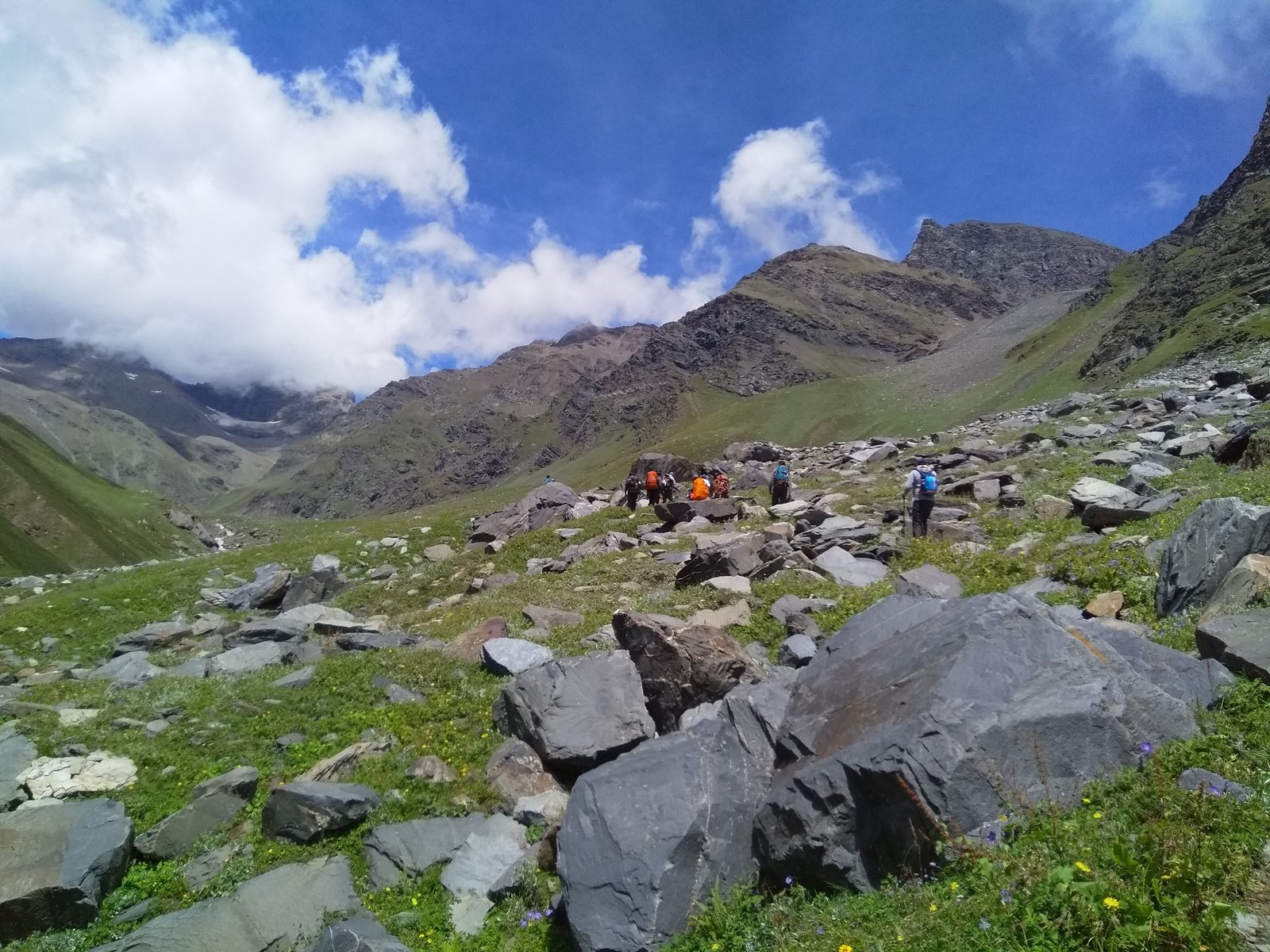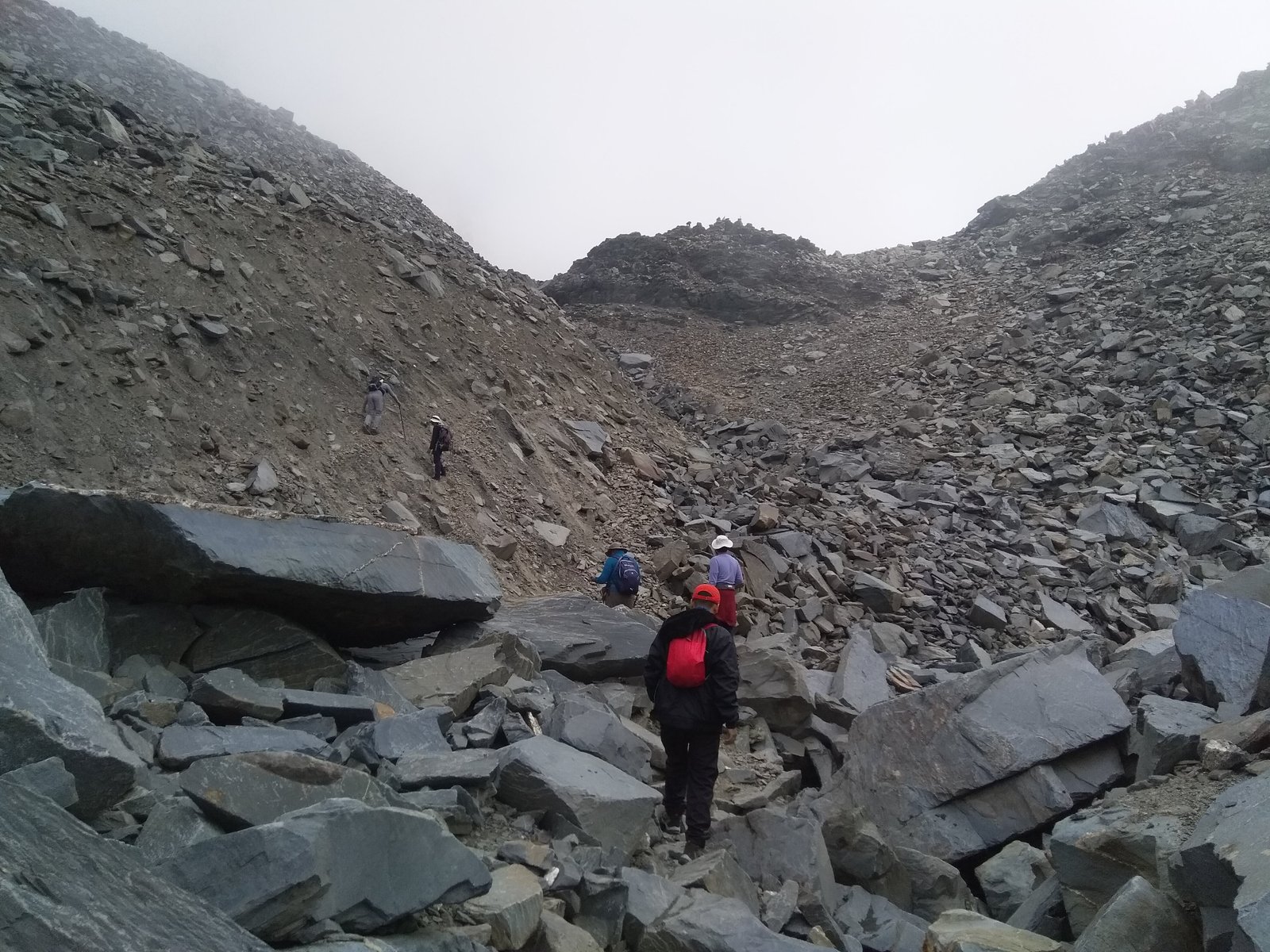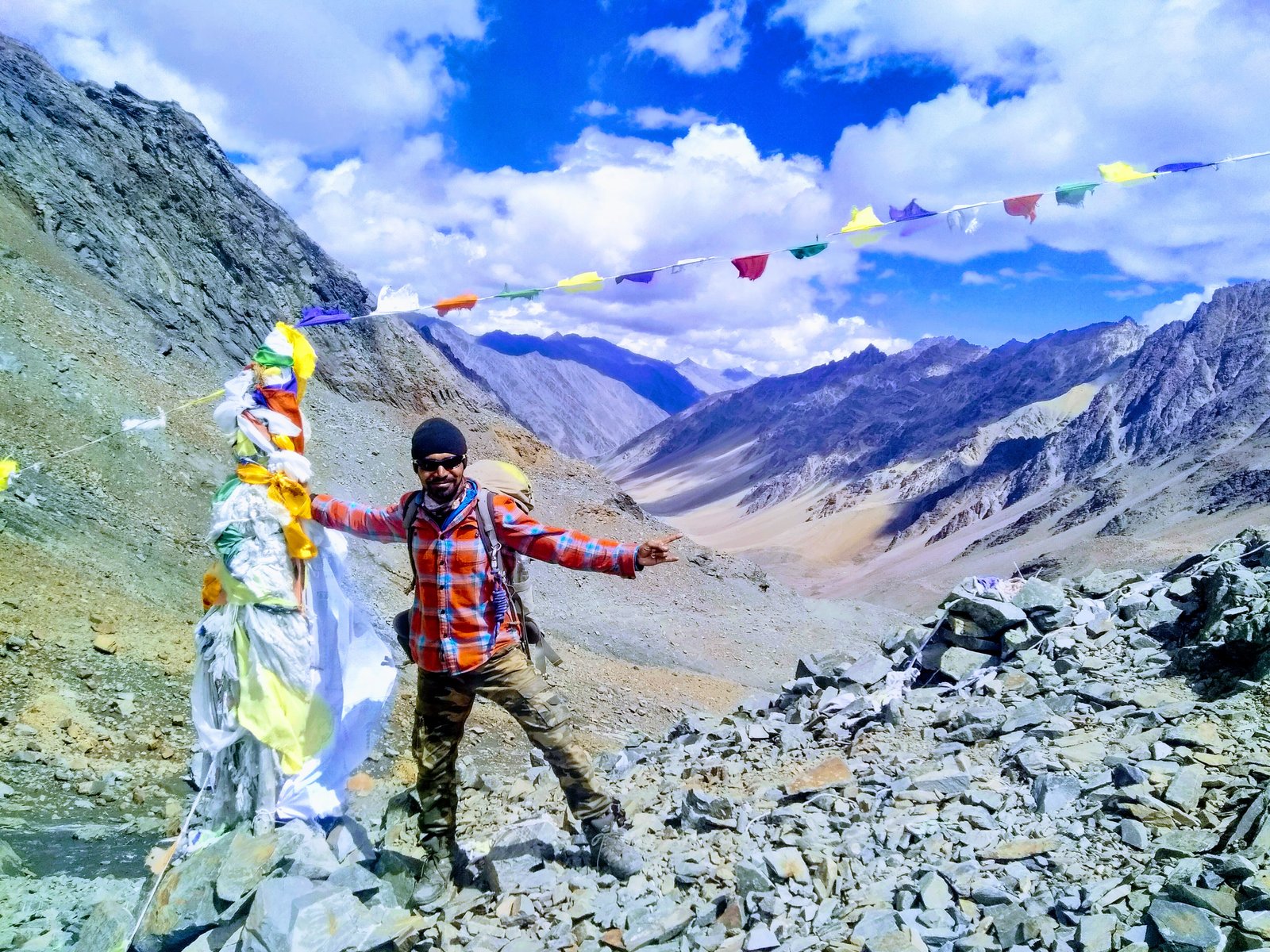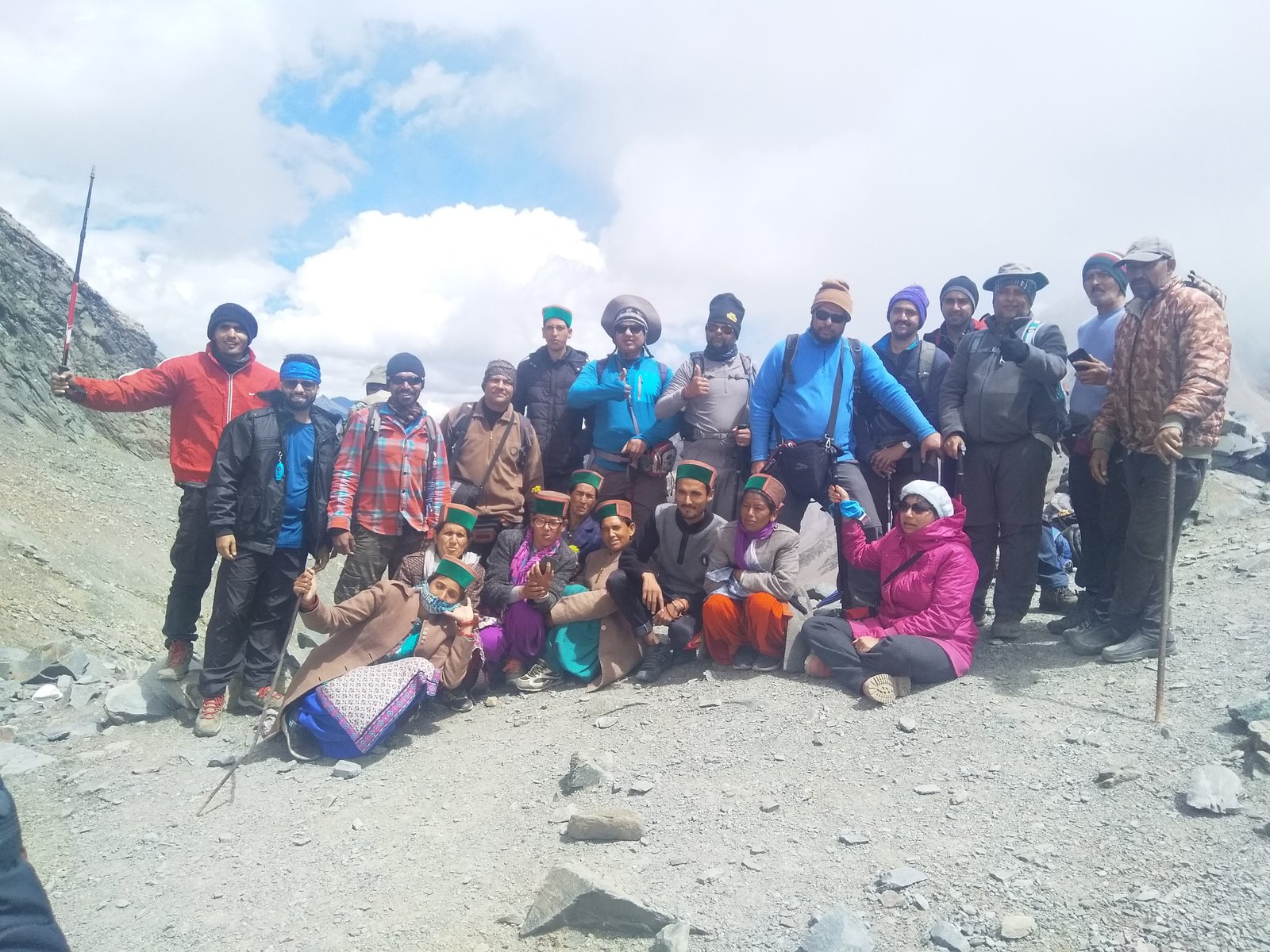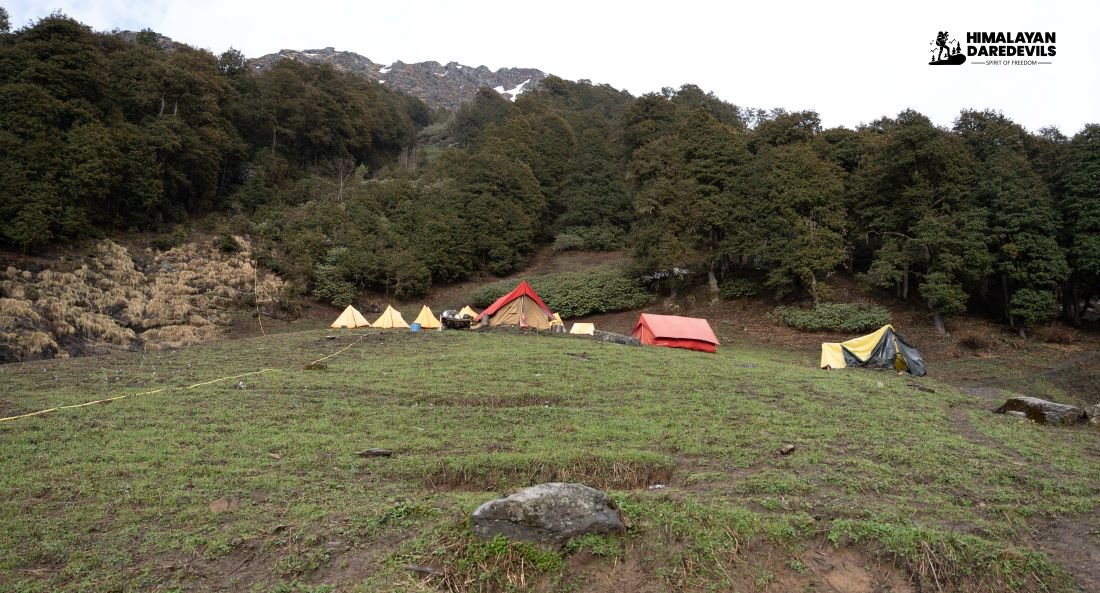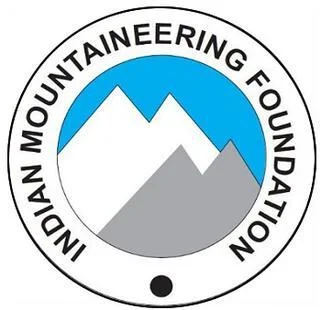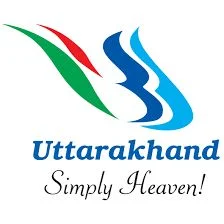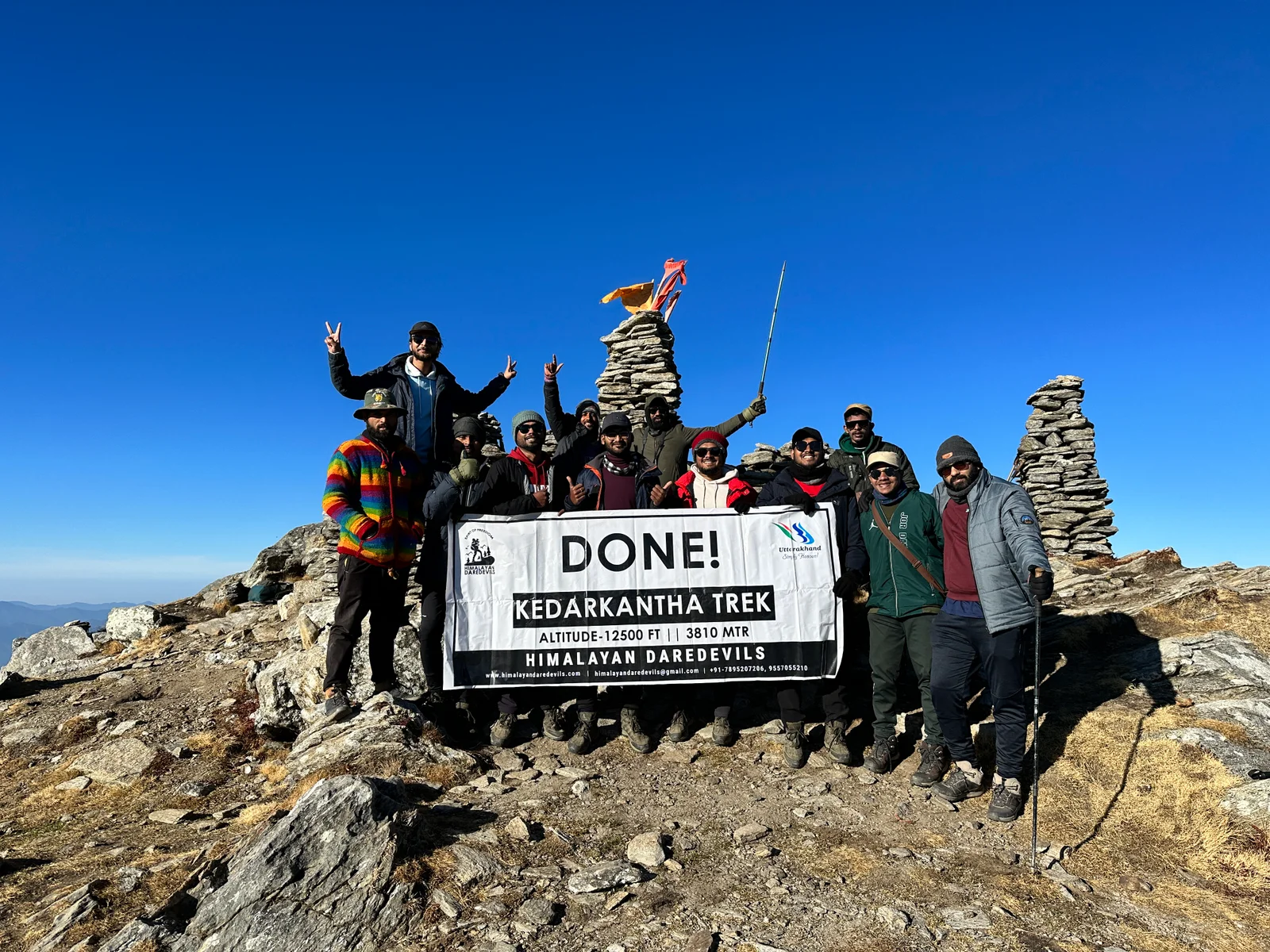Starting From
63,250
55,000.00
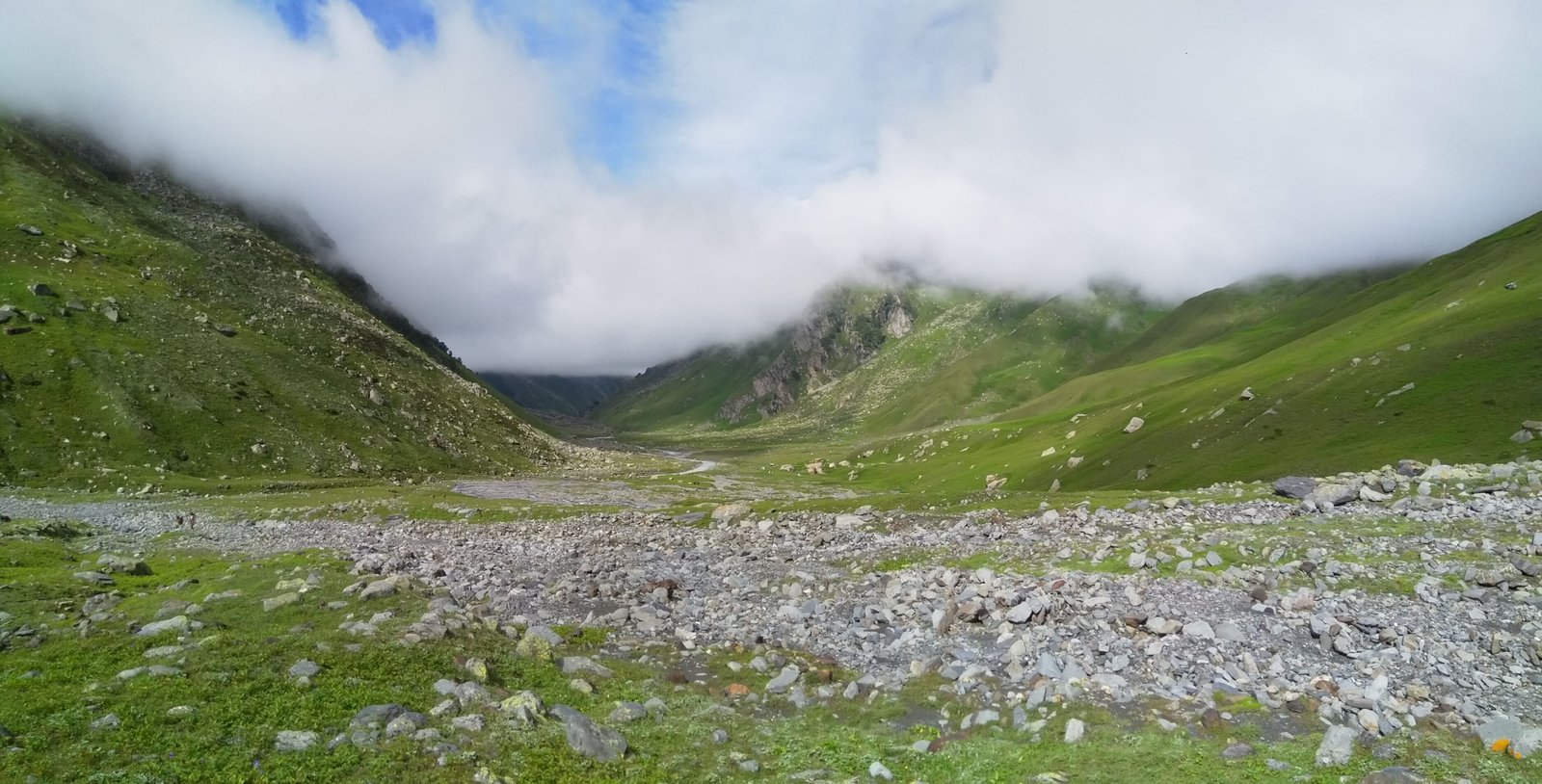
Starting From
63,250
55,000.00
Starting From
63,250
55,000.00
Khimloga Pass Trek (382+ Reviews)
The trek starts from Sankri and ends in Chitkul
Dehradoon Railway Station
Jolly Grant Airport Dehradoon
Sankri
May, June, September, October
Sankri to Chitkul
Veg
Hotel and Camp
Uttarakhand
9 Days
Difficult
18740 ft
58 Km
Overview
Khimloga Pass Trek – This high altitude pass lies in Dhauladhar range at an altitude of 5,712 meters and this range is between Uttarakhand and Kinnaur. It is affected by the geographical changes and the trails are not known by many. Many people attempted to traverse the pass but got unsuccessful only few were able to traverse it.
You would be stunned to know that this pass is traversed by one expedition team because it looks like it cannot be crossed. The difficulty level is high, it has crevassed glacier and walls very steep.
Khimloga Pass isn’t easy to conquer not even locals visit this place, the people who are looking for great adventure can for this expedition. You can explore this pass with team “Himalayan Daredevils” we have Sherpa’s and professionals in our teams who have completed the expeditions successfully.
Itinerary
Our vehicle picks you up from Dehradun railway station then leaves for Sankri (210 km), it takes 7-8 hours to reach there. The drive to Sankri is a picturesque one and you will come across plethora of sceneries on the way.
The scenic beauty of valley attract the visitor’s eye. You will see Yamuna River and Tons valley across the Yamuna Bridge, the crystal clear water gives a very refreshing feeling if you feel tired on the way. Drive is through some splendid places i.e. Mussoorie, Damta, Nowgao, Netwar and Purola.
These are the villages where you can see people working in fields and you can have a glimpse of their lifestyle. When you go through the forests, peep out of your window and look at the combination of dark and light greenery, it looks picture perfect.
We cross an entry gate of Govind Wildlife Sanctuary, Sankri lies there. When the Baraadsar mountain range and other snow-capped mountains are visible then you are about to reach Sankri, it will take 15-20 minutes more.
Sankri is a small village with less number of houses, there is a famous mini market of Sankri with few wooden huts serving traditional and delicious food. From here you can have a glance of some mountain ranges, it is surrounded by the mountains and the environment is pollution free, relish the beauty of Sankri.
Jakhol is 19 km away from Sankri, it is the last village of Supin valley at an altitude of 2200 metres. You can reach there in two hours.
Trek starts from Jakhol on along the left bank of River Supin, after you cross a bridge you will reach Baicha. From this point Obra Gad is visible and one can also go Devkiyara through this Gad. Now the trek is again along the Supin River from here you can have sight of Fithari village, there are fields and wooden huts visible.
Now the difficult climb starts and you will reach fields that are present on left bank of Supin. Trek through potato fields and after last ridge reach Liwari village (2,750 m). There is a temple of “Someshwar Devta” worshipped by the villagers. Setup your camps here and retire for the night.
Wake up early and visit Someshwar Devta’s temple, bow down and ask everything to go well. When your trek starts the first section is through potato fields and Sural Dhar is visible from here.
The other section of the trek starts through forests, there are different variety of trees like Deodar, Walnut and Pine, trek for 1 km and reach a bridge over Supin. The area is landslide prone and the some paths have been damaged. Now to reach Surmola Thach trek is tough through ice bridges and boulder zone.
Surmola Thach have green pasturelands, it is at an altitude of 3460 metres. At ridge top is a Lake “Badasu” and as the belief of locals they say that this Lake is sacred and pure. Set your tents at this beautiful campsite and stay comfortably for the night in tents.
Bid goodbye to the alluring fields of Surmola Thach and follow the right bank of Supin. Now, walk carefully through landslide prone region because the routes are washed away and some paths are damaged.
Climbing the ridge get because of the damage parts but when you reach the top there is a land which blooms, it becomes a relief to legs after ascending so hard. The scenic beauty is just heart-warming, there are colourful flowers and all green fields they together make a picturesque setting. Start descend towards Supin to reach your campsite Vishkhopri it is present at the confluence of Supin and Guggal Gad.
Vishkhopri is a wide place and you can see the colourful flowers blooming there. It is feast for the eyes and relief for legs because now you will be relaxing in the tents.
After having breakfast leave for Thangal Thach and when start trekking Guggal Gad is visible which comes down from Baslawatha. By following the stream one can reach Baspa valley and Devkiyara Ridge.
Ridge top offers unexpected magnificent 360 degree views of Khimloga Glacier, on the left views of other peaks are visible. This glacier is divided into two parts (Front is the main one) (part of North glacier on left). We will explore the Northern part.
Move along Basalwa Thach and reach Nishani Thach by moving along boulder area. From here you can also go to Baspa valley through Pataki Dhar. Reach your campsite Thangal Thach which is 1 km ahead and have comfortable stay in tents.
Today you have to reach Khimloga camp 1, start trekking over snow through moraine area and ahead is a glacier with crevasses. Be very careful because they can turn very dangerous.
There is a wall of moraine approximately of 70 degree and it will lead you to sharp top of the ridge. Have the views of huge Khimloga Glacier the sights may scare you and make you happy at the same time. The rocks and snowballs falling from above can be frightening but use your skills to overcome these challenges.
The glacier on North is broken which will make the climb difficult. Cross the moraine ridge it is risky because one slip can turn very risky, be attentive and you will cross the part easily.
Now you will come to the sharpest ridge top, have a sight of Khimloga Pass (5,712 m). Reach Khimloga Camp 1, rest after setting your camps and our professional leaders will go and look for the route conditions for a safer trek. Have food and sleep early in the tents.
You have to start your trek early because you have to reach snout of the glacier. After starting descend and cross the wall of moraine ridge through boulder zone and be careful of falling rocks.
Now, you can see a hanging glacier, a black snout which looks very scary. The trail isn’t difficult or very steep you have to only cross the ice ridges and you have to reach a last snow ridge top. Then the sudden sight of Khimloga Pass and semi-circular Khimloga glacier will surprise you.
Further is an ice field with crevasses, you keep walking on the right side of glacier until you reach a glacial pond. Have lunch in middle of the trek, packed lunch will be provided. Reach you campsite Khimloga camp 2.
Setup your tents and discuss about tomorrows trek because tomorrow is the summit day and it will be the toughest. Pray together to God to keep the weather conditions good and the trek safe. Have healthy food and retire for the night.
Wake up early pack up things and leave on time. Start climbing along the left ridge through a snow field. Have clearer views of Khimloga Pass and see that the path is bifurcated by a rocky projection.
Take right because the other path is very risky, by trekking for some time you will reach Khimloga Pass it is 10 feet wide, the closer view of peaks will amaze you. When you will stand at the top the feeling would be of great achievement and happiness. You will feel great that you have conquered the Pass which looks uncrossable and frightening.
Do not spend extra time there because descending isn’t easy and it will take time. Take out your ropes to descend towards North east is Nardu Gad glacier. The route to get down is through Janspa Gad, slide down wherever required, come down along Nardu Gad glacier and reach the ice fields.
Your campsite is Janspa Gad today is the last day of camping and tomorrow is the last day of Expedition. Set your camps here, celebrate conquering the pass and retire for the night.
Capture pictures with every member with you to have memories captured and then leave the campsite. When you will cross the ice fields you will see flowers blooming they will make you feel good by just being there.
Ahead Chitkul will be visible, it is the last village of Baspa valley with beautiful wooden houses and cultivated green pasturelands. They together look beautiful the environment there is fresh and serene. Go further and reach a ridge with abundant Rhododendrons and then you will trek the forest of pine.
Reach bank of Baspa and with a rope of steel reach Chitkul, a beautiful Himalayan village. Frome there you can see Nardu Gad coming from the left ridge and head of it is Khimloga Pass. Celebrate the success of your expedition.
Khimloga Pass Trek Map
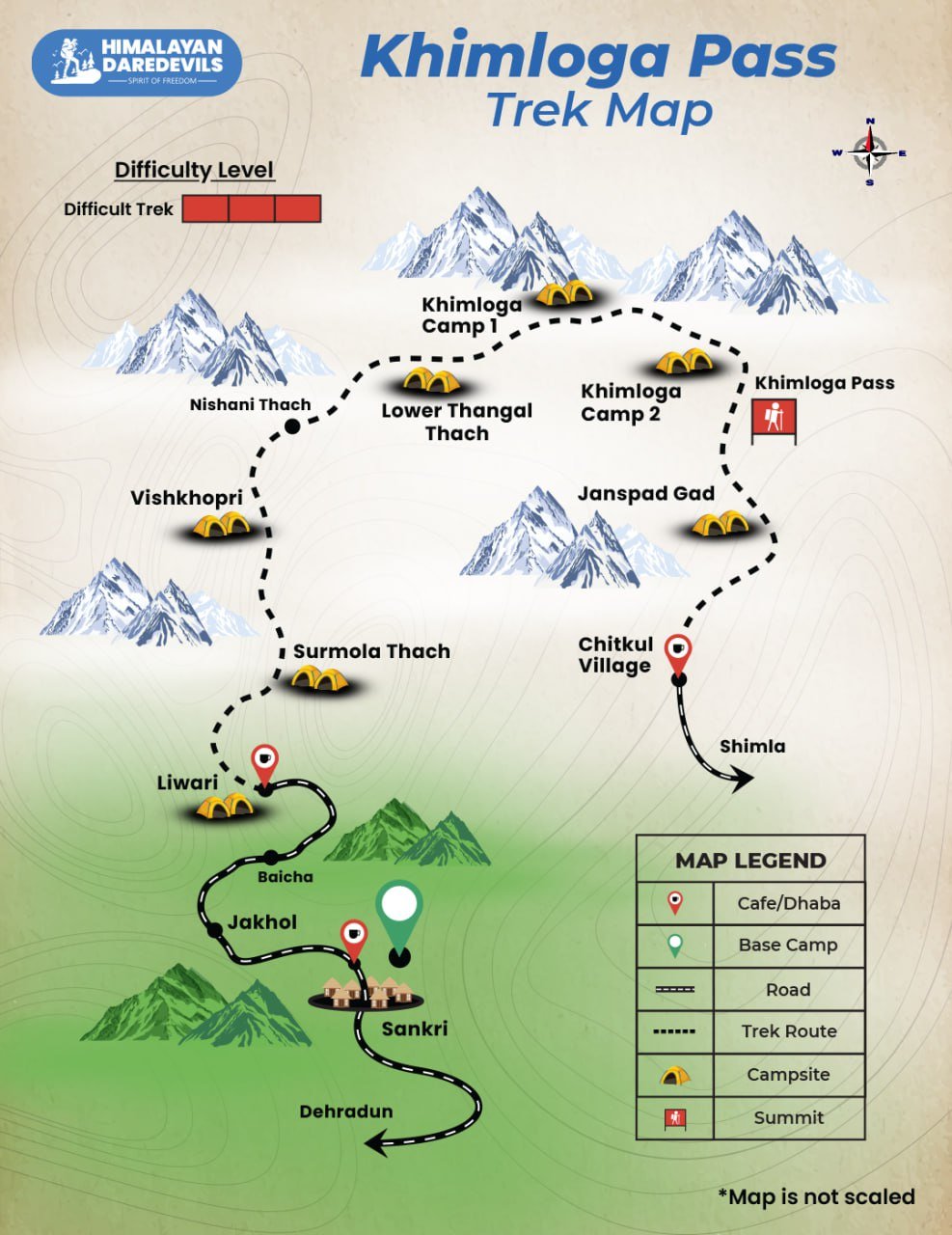
Inclusions
Exclusions
1. Meals while on trek (Veg.).
2. All necessary entry fees and permits.
3. Accommodation:- Guest house / Camping during Trek.
4. Mountaineering qualified & professional trek Leader, guide, cook, and Support staff.
5. First aid medical kits, stretcher, and oxygen cylinder.
6. Trek equipment: Sleeping bag, mattress, tent, kitchen & dining tent, toilet tent, utensils, and crampon (if required)
7. Staff Insurance.
8. Porters/mules to carry central equipment.
1. Any kind of personal expenses.
2. Food during transit.
3. Mules or porters to carry personal luggage.
4. Insurance.
5. Transport (Non Ac)
6. Any kind of emergency evacuation charges
7. 5% GST
8.Any expense incurred or loss cost by reasons beyond our control such as bad weather, natural calamities (landslides, floods), flight delays/rescheduling/ cancellations, any accidents/medical evacuations, riots/strikes/war/pandemics etc.
9. Anything not specifically mentioned under the head.
1. Meals while on trek (Veg.).
2. All necessary entry fees and permits.
3. Accommodation:- Guest house / Camping during Trek.
4. Mountaineering qualified & professional trek Leader, guide, cook, and Support staff.
5. First aid medical kits, stretcher, and oxygen cylinder.
6. Trek equipment: Sleeping bag, mattress, tent, kitchen & dining tent, toilet tent, utensils, and crampon (if required)
7. Staff Insurance.
8. Porters/mules to carry central equipment.
1. Any kind of personal expenses.
2. Food during transit.
3. Mules or porters to carry personal luggage.
4. Insurance.
5. Transport (Non Ac)
6. Any kind of emergency evacuation charges
7. 5% GST
8.Any expense incurred or loss cost by reasons beyond our control such as bad weather, natural calamities (landslides, floods), flight delays/rescheduling/ cancellations, any accidents/medical evacuations, riots/strikes/war/pandemics etc.
9. Anything not specifically mentioned under the head.
What to carry
- Trekking shoes: A good pair of trekking shoes is essential for a comfortable and safe trek. Look for shoes that are sturdy, provide good ankle support, and have a good grip on different types of terrain.
- Backpack with rain cover (50-60 ltr): A backpack is necessary to carry all your gear. Make sure it's the right size for your trek, and comes with a rain cover to keep your belongings dry in case of rain.
- Thermals (upper and lower): Thermals are lightweight and comfortable base layers that help regulate your body temperature in cold weather. Bring both upper and lower thermals to keep warm.
- 3 T-shirts (advisable quick dry): Choose quick-drying T-shirts made from breathable and moisture-wicking materials. This will help keep you cool and dry during your trek.
- 2 trek pants: Choose lightweight and comfortable trek pants that are easy to move in and can dry quickly if wet.
- Jacket (-10 degrees): A warm jacket is essential for cold weather. Choose a jacket that is waterproof and windproof, and provides good insulation.
- Fleece or hood (2): Fleece jackets or hoodies are great mid-layer options to keep warm. Bring at least two, as they can also be used as an extra layer at night.
- Sunglasses (UV protected): Protect your eyes from the sun's harmful UV rays with sunglasses that are designed for outdoor activities.
- Sun cap: A sun cap or hat with a brim will protect your face and neck from the sun.
- Hand gloves: Bring a pair of lightweight gloves to keep your hands warm and protected from wind and sunburn.
- Woolen cap: A woolen cap will keep your head and ears warm at night or in cold weather.
- Socks (3 pairs min): Bring at least three pairs of good quality socks that are moisture-wicking and provide good cushioning and support for your feet.
- Headlamp: A headlamp will come in handy if you're hiking in low-light conditions or need to find your way in the dark.
- Trekking pole (if needed): Trekking poles can help reduce strain on your legs and provide additional support on steep terrain.
- Rain cover\poncho: A rain cover or poncho will keep you and your gear dry during unexpected rain showers.
- Day pack (if you plan to offload your bag): If you plan to offload your backpack during the trek, bring a smaller day pack to carry essentials like water, snacks, and a first aid kit.
- A toiletry kit: Bring a small kit with personal hygiene items, such as a toothbrush and toothpaste, wet wipes, hand sanitizer, and toilet paper.
- Lunchbox, cup, spoon: If you plan to bring your own food, bring a lunchbox, cup, and spoon to carry and eat your meals.
- 2 one-liter bottles: Staying hydrated is crucial, so bring at least two one-liter bottles to carry water.
- 2-3 plastic covers to keep your wet or used clothes: Plastic bags are useful for keeping wet or dirty clothes separate from the rest of your belongings. They can also be used to pack out any trash or waste you generate during the trek.
How to reach
With a variety of means of transport available, this beautiful city. Find lots of beauty in every mode of traveling by road, air, or train as each route takes you through different sights. Get ready to be impressed by the mountains as you begin this marvelous trip.
By Road
From Delhi :
Distance: About 260 km.
Time: 6 to 7 hours.
Route: NH 44 should be taken; this road goes through Meerut, Muzaffarnagar, and Roorkee which is scenic.
Suggestion: You may take a cab or book a cab online rather than getting stressed out about availability.
Local Buses:
Frequency: Buses are available in the regions of Delhi, Chandigarh, and Haridwar after every hour.
Forms: AC and non-AC buses are both provided.
Booking: These can be bought online or at the bus stop
Self Drive:
Benefits: You can also check out places on your way around.
By Air
Jolly Grant Airport:
Distance from the airport to Dehradhun: It is 25 kilometers.
Air Transport Available: Major Indian metropolitan cities namely Delhi, Mumbai and Banglore have rounds of flights to this airport regularly.
Time: 1 hour starting from Delhi.
Transportation after the flight:
Alternatives: Taxis and private cabs are available outside the airport.
Time taken to travel from the airport to Dehradun: 40 to 60 minutes.
By Train
Dehradun Railway Station:
Connectivity: Trains connect it well to prime locations such as Delhi, Mumbai, and Calcutta.
Popular Trains:
Nanda Devi Express: Travel time is Nanda Devi overnight service.
Shatabdi Express: Day service; fast and comfortable.
Dehradun Express: Return options are available regularly.
From the Station:
Local Transport: Locals recommend wholesale taxis, auto-rickshaws, or local buses to the city or the trekking starting point.
Fitness and preparation guide for Khimloga Pass Trek
We recommend jogging as the best routine to get fit for a trek. It works on the same muscles that you use while trekking — your calves, glutes and hamstrings. It helps increase your stamina day by day. It is also an easy routine that does not require any equipment or tools.
Fitness target:
To do this trek comfortably, you must be able to cover 5 km in under 35 minutes. This is the minimum fitness required for this trek.
How to achieve this fitness?
- Start jogging at least 4 days a week
- If you cannot run 5 km immediately, start with 2 km and increase to 5 km over 2-3 weeks.
- Once you’re able to run 5 km, increase your pace day by day.
- Gradually increase your pace and bring it down to 5 km in less than 35 mins.
- You must be able to run 5 km in 35 mins consistently for at least 2 weeks before the trek.
This trek requires at least 6-8 weeks of preparation. The longer, the better. So plan your trek soon and start preparing.
Cancellation policy
Life is unpredictable and we understand sometimes you have to cancel or change your trip dates and it is our endeavour to make it as easy possible for you. However, please understand we plan everything including guide fees, permits, accommodation and ration in advance. Therefore any cancellation means inconvenience and certain losses to the people involved in various stages of programme. Keeping that in mind, our cancellation charges are as below-
Cancellation prior to 30 days from start of the event: Get monetary refund with 15% of cancellation charges on trek fee.
Cancellation between 30 days and 15 days to the start of event: 50% on trek fee is non refundable and the remaining 50 % will be given as cash voucher which is valid for 1 year.
Cancellation less than 15 days to the start of event: No refund.
Please note cancellation will be only accepted by email.
Booking amount is non refundable
Note: The Himalayan Daredevils reserves the right to cancel a programme before departure in the event of logistical problems arriving due to natural calamities, strikes, wars on any other circumstances that makes the event inadvisable. In this case, 50% on trek fee is non refundable and the remaining 50 % will be given as cash voucher which is valid for 1 year.
Itinerary changes & trip delays:
We plan itineraries based on the information at the time of planning and in rare circumstances, there are subject to change. In the event that the itinerary is changes or delayed due to unforeseen circumstances such as bad weather conditions, transportation delays, government intervention, landslides etc. We will always aim to give you the best experience possible. However The Himalayan Daredevils are not be held responsible for the cost of delay or changes.
Why Choose Us
